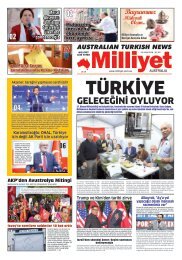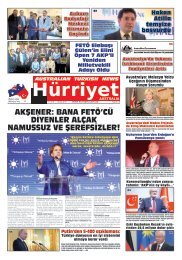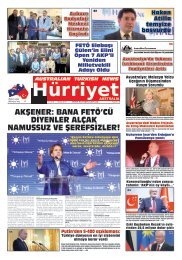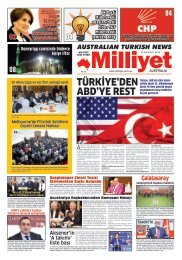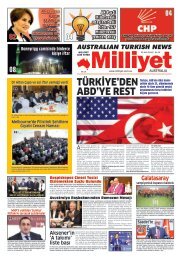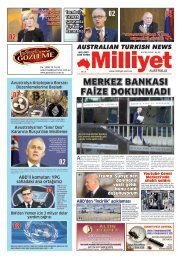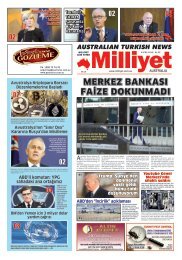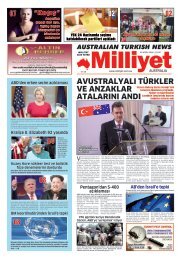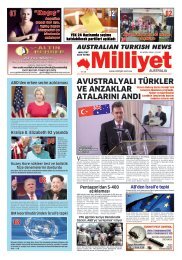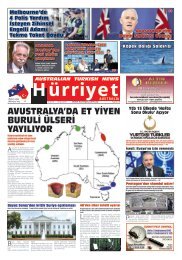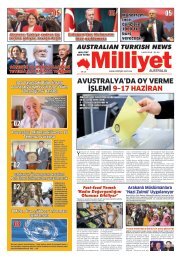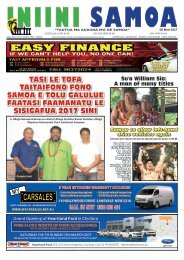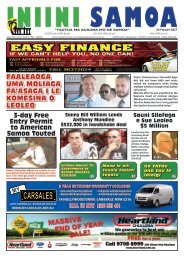You also want an ePaper? Increase the reach of your titles
YUMPU automatically turns print PDFs into web optimized ePapers that Google loves.
4<br />
06<br />
<strong>June</strong> 2016 Health Australia Samoa Newspaper<br />
STROKE ( CVA-Cerebrovascular Accident )<br />
Stroke is a medical<br />
emergency .<br />
It occurs when a<br />
part of the brain is damaged<br />
because it is deprived of blood<br />
supply and oxygen.<br />
Stroke is the third most common<br />
cause of death in Australia<br />
behind heart disease and cancer<br />
. It usually affects the over<br />
65 yr old group and can cause<br />
long lasting disabilities in terms of speech<br />
and movement.<br />
There are 2 main types of stroke :<br />
1. Ischaemic stroke<br />
2. Haemorrhagic stroke.<br />
The National Stroke Foundation recommends<br />
the F.A.S.T test as an easy way to<br />
remember the most common symptoms of<br />
stroke .<br />
Dr.Paniani Patu<br />
of a stroke but they are usually<br />
temporary lasting only a short<br />
time from a few minutes to a<br />
couple of hours and are reversible.<br />
It is important to seek medical<br />
help immediately when<br />
these warning signs happen as<br />
they can lead to a full stroke if<br />
ignored.<br />
The treatment of stroke /TIA<br />
involves urgent transfer to a hospital to ensure<br />
no further damage to the brain occurs.<br />
The management depends on the type<br />
of stroke using emergency measures with<br />
drugs and / or surgery .<br />
Modification of lifestyle-<br />
1. smoke cessation<br />
2. more physical activities<br />
3. moderating alcohol intake<br />
4. weight reduction<br />
5. Blood pressure and cholesterol control<br />
as well as diet management ie low in salt<br />
and saturated fats - may help slow the progression<br />
of damage to the blood vessel wall<br />
and prevent further strokes.<br />
Long term rehabilitation with speech pathologist<br />
and occupational therapist will help<br />
with physical and speech disabilities and<br />
assist with return to some level of functioning.<br />
Support and resources<br />
1 .www.brainfoundation.org.au<br />
2. www.strokefoundation.com.au<br />
3. www.heartfoundation.org.au<br />
F ( Face ) check the face and see if<br />
mouth has dropped.<br />
A ( Arms ) can they lift both arms ?<br />
S ( Speech ) Is their speech slurred and<br />
can they understand you ?<br />
T ( Time ) Time is critical .<br />
If you see any of these signs then most<br />
likely it is stroke and to call 000 straight<br />
away.<br />
The Risk factors for stroke .<br />
1. Age -the older you get the greater the<br />
risk<br />
2. Sex – men are more likely to be affected<br />
3. Blood Pressure<br />
4. Cholesterol<br />
5. Smoking cigarettes<br />
6. Diabetes<br />
7. Lack of physical exercises<br />
8. Atrial Fibrillation ( irregular heart beat )<br />
Warning Signs – TIA ( Transient Ischaemic<br />
Attack )<br />
TIA also called mini strokes occur when<br />
there is a temporary blood clot and part of<br />
the brain does<br />
not get the supply of blood it needs .<br />
The symptoms of TIA are similar to those<br />
Ole Stroke (CVA) ose fa’amai e oso<br />
faafuasei ma e tau leai ni faailoga e iloa ai<br />
ole a foufou mai.<br />
E mafua ona ua punitia ala toto ile faiai<br />
e se potopotoi toto e amata mai ile fatu poo<br />
ala toto tetele ile ua( neck) . E tasi foi lenei<br />
mafuaaga tele o tagata e maliliu i Ausetalia<br />
nei. E tele ina faatoa alia’i mai pea oo se<br />
tagata ile matua ole 65 pe sili atu foi o<br />
tausage ole soifua. E 2 ni vaega tetele ua<br />
vaevaeina iai le stroke e pei ona taua i luga.<br />
Ua faamatalina ele National Stroke<br />
Foundation a Ausetalia e faapea o auga o<br />
lenei faaletonu e faigofie ona taumateina<br />
pe afai e silasila i vaega nei<br />
1. Foliga – Face – ua pio le gutu<br />
2. Lima – Arms- ua pe le lima ma ua le<br />
mafai ona sii i luga<br />
3. Tautala – speech- ua sauea tala ma ua<br />
le malamama foi ini tala.<br />
4. Manaomia le faatopetope ole vili ole<br />
telefoni 000 mo se fesoasoani –time.<br />
E fautuaina ai a vaaia loa auga uma nei<br />
ise tagata e mautinoa lava le tulai mai ole<br />
stroke ma e manaomia loa le vave ona si’i<br />
ile falemai.<br />
L-R Minerva Patu; Faletua Michiko Ete-Lima; Faletua<br />
Senetenari Peleti Toailoa; Leota Tima Leavai (lawyer)<br />
Faa Samoaina ole Stroke – CVA<br />
O mafuaga ole CVA-<br />
1. tagata matutua ua oo atu ile 65<br />
tausaga le matutua<br />
2. e mafuli ile itupa o tamaloloa lenei<br />
faaletonu .<br />
3. maualuga le fua ole toto .<br />
4. maualuga le fua ole gao ile toto .<br />
5. malosi le ulaula tapaa<br />
6. faamai ole suka<br />
7. e le lava le faagaioi ma le faaafu ole<br />
tino .<br />
8. e le tata lelei le fatu ae tata feto’ito’i<br />
ona mafua ai lea ona maua potopotoi toto<br />
ile fatu<br />
ma agai atu ai ile faiai .<br />
TIA- Ole faailo lea e ta’u mai ai ole a<br />
foufou mai se stroke i tua atu ma e taua le<br />
faia oni siaki ole fatu ma isi ala toto tetele<br />
ole ua ( carotid US ) ina ia puipuia ai le<br />
tulai mai ose stroke e afaina tele ai le tino<br />
ma le tautala.<br />
O lenei faamai ole stroke / TIA e taua le<br />
vave togafitia ina ia puipuia ai le faateleina<br />
ole afaina ole faiai. E iai fualaau ma ta”otoga<br />
e manaomia pe a oso faafuasei mai .E iai foi<br />
tagata tausimai e gafa<br />
L-R Minerva Patu; Faletua Teki Uilelea; Toeaina Fatonu Rev Iosefa<br />
Uilelea (Lotofaga); Afioga Fiame Naomi Mataafa (Sui Palemia);<br />
Dr Seagaitumua Paniani Patu<br />
ma le togafitiga ma e fesoasoani lea mo<br />
le tautala ma le faamalosiina o aao pea le<br />
toe migoi.<br />
Ole togafitiga taua lava ole taofi lea ole<br />
tapaa- faaititia le tagofia ole ava malosi –<br />
faaititia le tino lapopo’a – faagaioi le tino<br />
ma faaafu i le tele o aso –faapea le faaititia<br />
o meaai oona ma le lololo.<br />
A fia maua nisi faamatalaga mo lou<br />
soifua maloloina ona faafesootai mai lea o :<br />
Dr Paniani S. Patu ile tuatusi fou ma le<br />
telefoni 0418 422 726 / (02) 9636 4611






